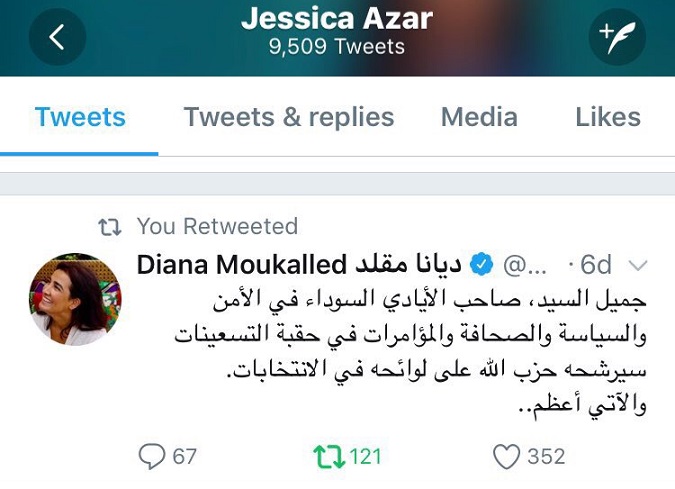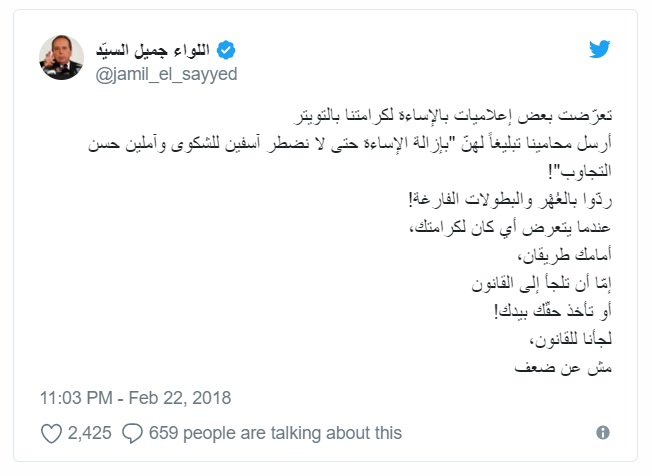Home > Media News >

Source: http://www.arabnews.com
A television news anchorwoman in Lebanon has vowed to defend her right to freedom of expression after being threatened with legal action by a former security chief who is now a candidate in the country’s upcoming elections.
News presenter Jessica Azar says she will not be intimidated by Jamil Al-Sayyed, former head of Lebanon’s General Security Directorate, who has threatened to sue her over what he considered were slanderous comments on Twitter.
“This is not how the media should be dealt with in Lebanon,” said Azar. “I have the right to defend freedom of speech and to express my opinion, and the support I have received shows Lebanon will not let freedom of speech be harmed.”
Azar’s case has sparked outrage not only from other journalists but also from the public. The hashtag #wearesupportingjessicaazar was trending on Friday, and supporters posted pictures of Azar with a gag superimposed over her mouth and the Twitter bird symbol with its beak tied up with rope.
The 31-year-old presenter told Arab News she also has the support of Melhem Riachy, Lebanon’s minister of information.
“He just called me, he supports me and he is going to tweet about it,” she said.
The furor began six days ago when journalist Diana Moukalled tweeted about Al-Sayyed’s candidacy, saying he had “mischief” on his hands. Azar retweeted the comment without adding any remarks of her own.

“On Thursday, I was off and got a call from my office saying there was a man there with some papers for me, and that if I refused to delete the retweet, I would be sued,” Azar said.
She responded on Twitter, saying she felt honored to be among Al-Sayyed’s targets.
“It is an honor that he has brought a case against me. Just a retweet has stirred Jamil’s longing for the hateful past that has become obsolete in Lebanon and the Arab world, ” Azar wrote.
On Friday, Al-Sayyed tweeted what appeared to be a veiled threat against Azar. Without naming her, he wrote: “Some female media personalities have insulted our dignity on Twitter. Our lawyers have sent them a letter asking them to ‘remove the abuse so that we do not have to complain and we hope to get a good response.’ They responded with derision. When anyone insults your dignity, there are two routes before you — you can either resort to the law or take matters into your own hands. We resorted to the law.”

Al-Sayyed’s lawyer, Charbel Ghoussoub, told Arab News that Al Sayyed had not launched a lawsuit against Azar and Moukalled but only sent them a legal warning letter, urging both to remove their “libellous” Twitter posts.
The letter was delivered to Azar’s workplace at MTV television station, but as of late Friday, Moukalled had yet to receive her letter, apparently because Al-Sayyed’s lawyers had been unable to locate her address.
Moukalled told Arab News she would not comply with any demand to remove her tweets.
“I’m not going to remove my tweets. I believe Jamil Al-Sayyed is a public figure — he was an official, he represented the government in the security office — and my comment was related to a period I have lived through in Lebanon as a journalist and as a citizen. I met a lot of people telling their stories about their ordeal with Jamil Al-Sayyed.”
Al-Sayyed, 67, was director-general of Lebanon’s General Security Directorate from 1998 to 2005, a dark period in the country’s history when it was recovering from civil war and living under quasi-occupation by Syria. He was implicated in the assassination of the former prime minister Rafik Hariri and spent four years in detention before being released for lack of evidence.
His row with Azar and Moukalled highlights the changing landscape for the press in Lebanon in the run-up to the May elections — the first for eight years. Long regarded as a bastion of free speech in the Middle East, the country appears to be conducting a concerted clampdown on journalists, commentators and bloggers.
Leading talk show host Marcel Ghanem is facing legal action because of remarks made by a guest on his popular talk show, “Kalam Ennas,” in November. In a live broadcast, Saudi journalist Ibrahim Al-Merhi accused the president, Michel Aoun, and Nabih Berri, speaker of the parliament, of being “partners” in “Hezbollah’s terrorism.”
“The Lebanese journalist used to be a pioneer for freedoms for the entire Arab World,” said Ghanem. “Is it possible that today Lebanese journalists are afraid of the spectre of the authorities?”
A military court sentenced Hanin Ghaddar, a Lebanese analyst and outspoken critic of Hezbollah based at the Washington Institute, to six months in prison for claiming the Lebanese army was soft on Shiite Hezbollah but tough on Sunni extremists.
The justice minister, Salim Jreissati, said Ghaddar’s comments — made in 2014 at a US symposium — were tantamount to accusing the army of treason, which was not protected by the freedom of speech principle in the Lebanese constitution.
Last July, journalist Fidaa Itani was detained and interrogated after criticizing the army’s treatment of Syrian refugees in a Facebook post. Diana Moukalled recalled Al- Sayyed’ s role in prosecuting writer Samir Kassir, who was killed by a car bomb in 2005.
But Azar said that in imposing the crackdown, the authorities had not reckoned with public opinion.
“It is true that attacks on the press are increasing, but the voice of the people is also increasing,” she said. “Whenever it happens, the people speak out loudly and half of Lebanon tweets about it. The Syrian phase is over.”
The US-based Committee to Protect Journalists (CPJ) has also voiced its concern over increasing harassment of the media in the country.
“More journalists are being prosecuted for defamation and the use of military courts is disturbing,” said Sherif Mansour, Middle East and North Africa coordinator for the CPJ.
“What is of even greater concern is the government specifically targeting people through social media and online. In Lebanon, the authorities have invested in technologies and tools to enable the security apparatus to monitor and mount surveillance on and abuse the privacy of individuals.
“There are countries in the Middle East which have traditionally been open but which are becoming more aggressive toward critics.
“Undoubtedly, there is tension in Lebanon ahead of the first elections to be held there for years. People are looking forward to stable government, but not all parties can agree on what stable government looks like,” Mansour said.
The lawyer acting for Lebanon’s former head of General Security, Jamil Al-Sayyed, told Arab News that he had been asked to send a legal warning to Moukalled and Azar, urging both to remove their posts on Twitter.
“We addressed them with a notarized warning,” said Charbel Ghoussoub, Al-Sayyed’s legal representative.
He said the warning is not a lawsuit, but an ultimatum served to Moukalled and Azar by a court bailiff delegated by a notary public.
Al-Sayyed described the Tweet, which described him as “a man of mischievous hands,” as libelous and said it “offended him personally.”
Ghoussoub said Azar had been served with the warning at the television station where she works, but the bailiff had handed the warning to the gatekeeper rather than directly to the presenter who was not there at the time. The gatekeeper than misinformed Azar that it was a full lawsuit rather than a warning, Ghoussoub said.
Moukalled had not been served with the warning yet since her address was still unknown, he said.
Right Now

18 Jul, 2025 / 09:39 AM
Uber to invest 300 million-dollar in EV maker Lucid as part of robotaxi deal

21 Jul, 2025 / 08:40 AM
Google’s AI can now call local businesses to check prices and availability on your behalf
Top Stories








